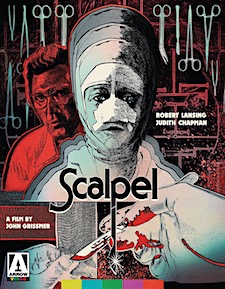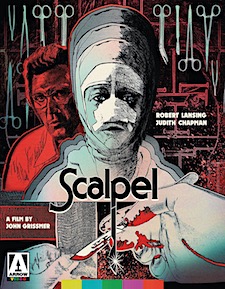Scalpel: Special Edition (Blu-ray Review)

Director
John GrissmerRelease Date(s)
1977 (February 27, 2018)Studio(s)
PJ Productions/United International Pictures/Embassy Pictures (Arrow Video)- Film/Program Grade: B-
- Video Grade: B+
- Audio Grade: B+
- Extras Grade: B-
Review
Feeling more like a long-running soap opera adapted for the big screen, Scalpel’s plot involving a deeply disturbed plastic surgeon who alters the appearance of a young woman to look like his missing daughter in order to inherit a family fortune (among other things) is characteristically all over the map when it comes to tone, structure, and style, but high on entertainment value overall.
Most assuredly a better and more coherent film than John Grissmer’s follow-up Blood Rage (a newly-rediscovered horror fan-favorite), it also features excellent performances from Robert Lansing and Judith Chapman, the latter of whom fills out two roles with ease. The interplay between her and Lansing as she plays dual characters is the highlight of the film. Genuine moments of suspense are there to be felt, but there’s also an excruciatingly uncomfortable love triangle which goes for romance, but also throws in doses of double-crossing and revenge.
With an Altman-esque style of severing narrative threads, using voiceover from other scenes to double up on storytelling, and subjecting viewers to oddball moments where reality and fantasy intermingle, Scalpel makes for an interesting and effective suspense drama that appears to know what it’s doing, but in hindsight, perhaps not always.
Arrow Video presents Scalpel on Blu-ray for the first time with a presentation sourced from a 2K restoration of a 35mm color reversal internegative element. Unfortunately, the original 35mm camera negative couldn’t be located. In an unusual but welcome move, we’re given the option of watching the film in two different ways, as Arrow further explains: “Scalpel is presented on this release in two different visual grades, both from the same restored materials. Director of photography Edward Lachman shot the film with a “Southern Gothic” look in mind, with strong warm yellow and green tones. Edward Lachman supervised and approved the grading for this version. The second version, the “Arrow Grade”, presents the film in a more traditional look, and included here for comparative purposes. Users can switch between the two versions during playback via the Popup menu.” For me personally, I found the overtly yellow and green presentation of Lachman’s color grade to be quite effective. Grain is well-rendered revealing plenty of image depth and detail, aside from the black levels which are much darker in the Lachman grade. Brightness and contrast levels are excellent as well and the transfer is stable with no leftover damage or debris. The lone audio option for both versions is an English mono LPCM track with optional subtitles in English SDH. A primarily-dialogue driven film, its audio presentation also gives plenty of support to score and occasional sound effects. The dialogue itself is clean and clear and there are no major instances of hiss or distortion.
Arrow Video’s presentation is supplemented with an excellent set of extras, which include an optional introduction to the film by director John Grissmer; an audio commentary with film historian Richard Harland Smith, who gives a very insightful and informative look at the film and beyond; The Cutting Edge with John Grissmer, a 14-minute interview in which the director discusses his career and his work; Dead Ringer with Judith Chapman, a 17-minute interview with the actress discussing her career and her experiences making the film; Southern Gothic with Edward Lachman, Jr., a nearly 16-minute interview with the film’s director of photography discussing his background in painting, his approach to shooting the film, and his impetus behind his color grade; an animated image gallery; a theatrical trailer for the film in HD; and a 32-page insert booklet with the essays “20th Century Alchemy: John Grissmer’s Morbid Melodramas” by Bill Ackerman and “Scalpel: A Slice of Death” by David Konow, as well as restoration details.
Scalpel is, above all things, a straight-up southern soap opera. I wouldn’t necessarily describe it as a southern gothic story, per se, but its elements might suggest otherwise, depending upon your viewpoint. Arrow Video’s presentation of the film saves it from obscurity, especially in the United States where it hasn’t been seen much since its VHS days on the Charter Entertainment label. It’s also not a horror film by definition, but genre fans will find plenty about to appreciate.
- Tim Salmons

